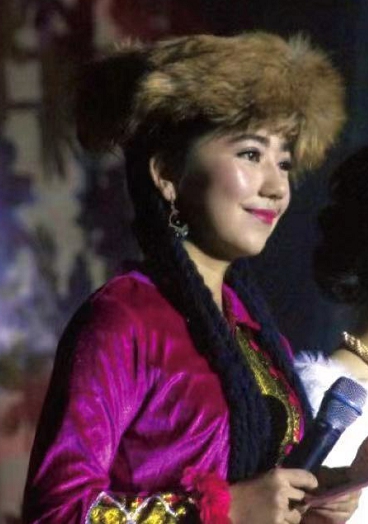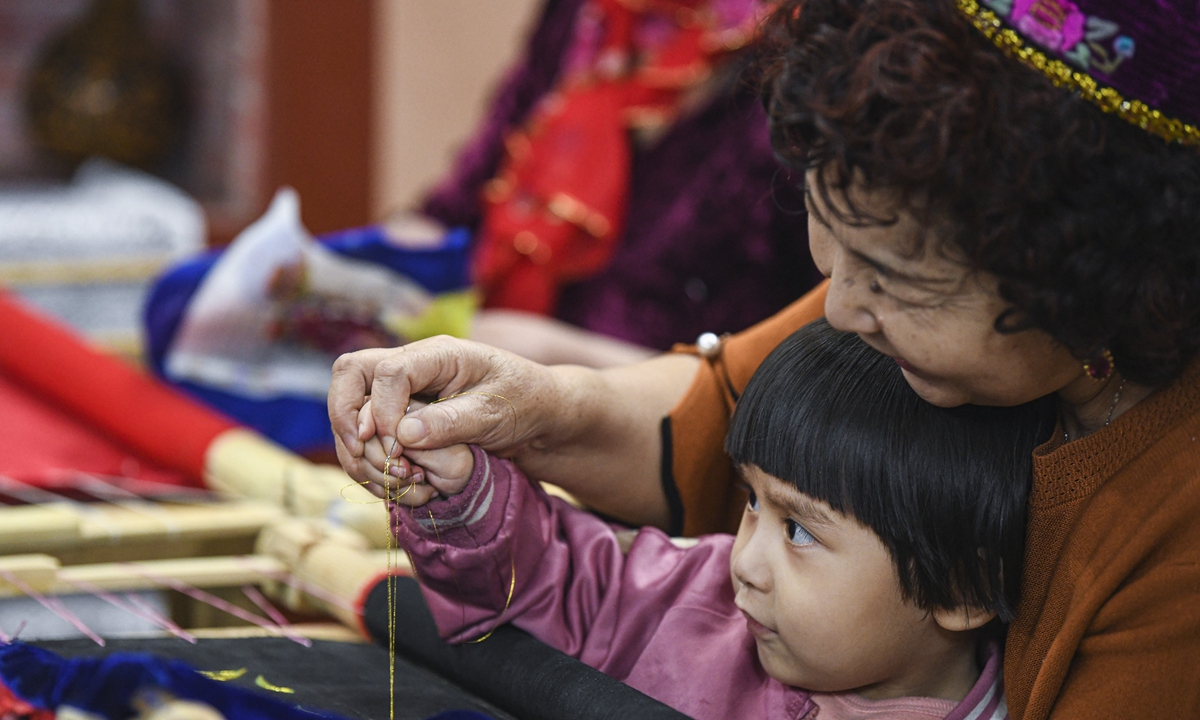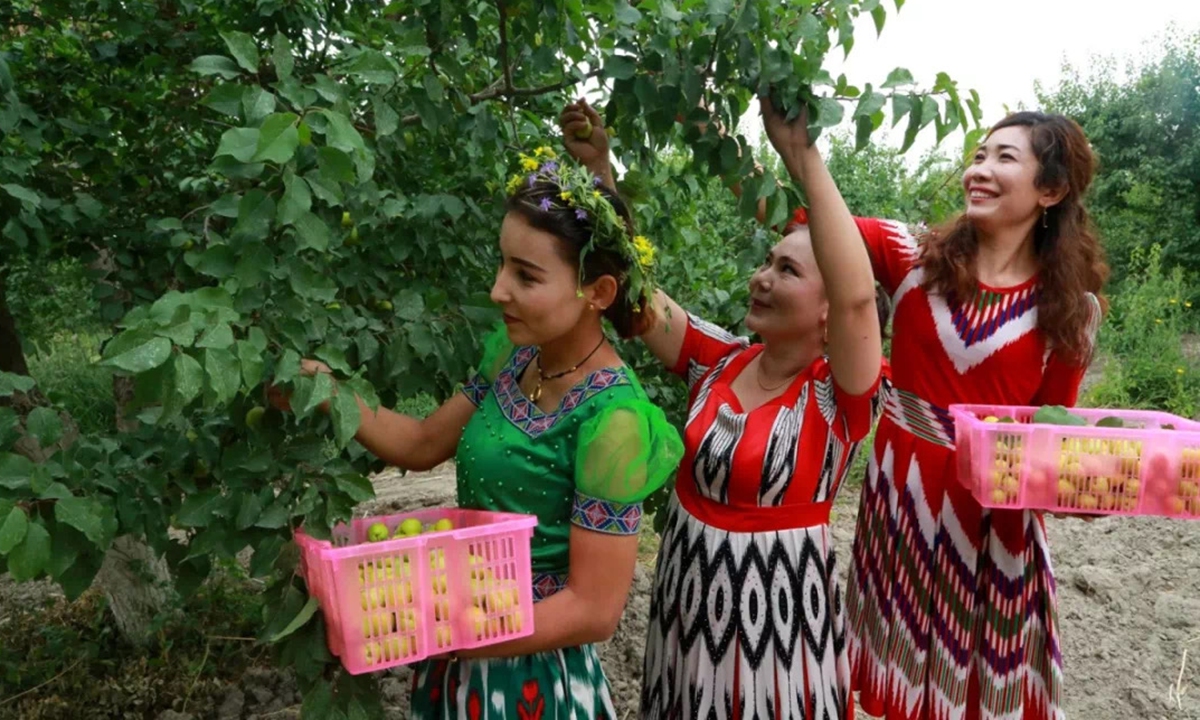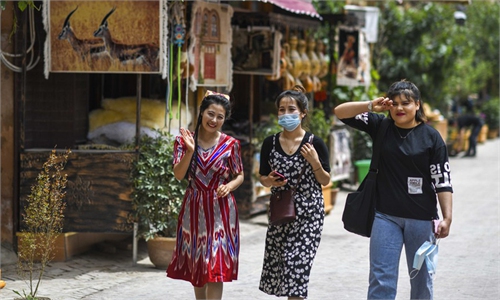IN-DEPTH / IN-DEPTH
Uygur girl from Xinjiang town damaged by terrorist attack talks her views about vocational education and training centers
‘I want to speak up for China’: Female Uygur university student shares changes in her Xinjiang hometown

A view of Ili Grasslands in Xinjiang Uygur Autonomous Region. Photo: IC
Editor's Note:For a long time, hyping the so-called Xinjiang issue has been an important route for many Western-based anti-China forces to attack China. Under the guise of "protecting human rights," they turned a blind eye to the achievements in development in Xinjiang Uygur Autonomous Region, while fabricating wild rumors like "forced labor" and "genocide."
What, however, does the real Xinjiang look like through the eyes of the local people? What happened after a ruthless attack perpetrated by separatist and terrorist groups on their hometown, and how did local people find the courage to carry on? What is the truth about vocational education and training centers and the fabricated situation conjured and hyped by the West media? We find all the answers in this article penned by a Uygur girl from Xinjiang for the Global Times.

Ranyila Abulikenmu Photo: Courtesy of Abulikenmu
My name is Ranyila Abulikenmu, a 21-year-old Uygur student from Xinjiang. Now I'm a junior student at the School of Journalism and Communication at Southwest University of Political Science and Law in Southwest China's Chongqing Municipality.My hometown, Yangxia town in Luntai County, is located at the foot of the Tianshan Mountains. I started helping my family herd sheep at the age of eight, and I called myself a shepherdess at the foot of the Tianshan Mountains.
The beautiful Tianshan Mountains often bring me infinite imagination. The beauty there all year round is like a memorable landscape painting. As an ancient Chinese poem says, "I bid you farewell at the east gate of Luntai, the Tianshan Mountains pass come under heavy snow as you take your leave; soon I lose sight of you as you follow the turns into the mountains, all there is on the snow are hoof prints where the horses have been."
Growing up in an 'injured town'
Yangxia, where I grew up, is a town of a population of fewer than 14,000 people, and home to 2,380 farmer households. Grain and cotton cultivation has been the main source of livelihood here, with the cultivation of small white apricots as a side business. People of all ethnic groups in the town are kind-hearted; we help each other and live a very full life.
However, our peaceful life was interrupted on September 21, 2014, when 10 people were killed, 54 got injured, and 79 vehicles in the town were damaged in a violent terrorist attack.
I watched a video of the bloody and heinous crimes committed by the violent terrorists. Later, I heard a police officer in the town say that at the time, rather than hiding from the presence of police, they instead charged at them, slashing them with knives and tossing explosives at civilians. It was as though they were unhinged. The violent terrorist incident which took place in my hometown made my heart ache. But I believe that those who engaged in violent and terrorist activities were the minority, and most people there are very kind. My grandpa, for example, is a haji who had been to Mecca. He never asks me to study [Islamic] scriptures. I've spent much time with him, and what I hear most from him is his hopes for world peace and for me to be happy every day.
Since I was a child, I have had a seed in my heart, a seed of peace and opposing violence.
Walking out of the Tianshan Mountains
When I was a child, my father built a small sheep barn not far from our home, with more than 40 sheep inside. He said they were old, sick, and disabled sheep that were unable to adapt to the harsh climate of the high altitude region, so he brought them back from the mountain pastures for special care. Gradually, I took over the task of herding the sheep, and I took them to the nearby meadow to graze and drink every day.
My father was a quiet man, but he was kind-hearted and upright. He always asked us to remain disciplined and to do things in a down-to-earth manner.
There are three children in my family, when we were in elementary school, our parents made all three of us take classes taught in Putonghua. But we suffered a lot of flak for it, including relatives and friends of our family, who thought we were "heretics" for learning Putonghua.
I remember my mother once cried and said that her friends said she was brainwashed to do the wrong thing, which would send her three children to hell. My father was angry when he heard this. "We made the right choice and time will tell," he said. We three children were also very upset at that time, realizing that our parents were under so much pressure to let us study normally.
My mother is a tough woman. Previously our family had opened a small restaurant. At that time she would work hard from dawn to night, and would subsist on three hours of sleep a night, but she persevered for many years. Her hard work and inconquerable spirit deeply influenced me.
Later, I was admitted to the secondary school in Korla. At the age of 13, I left my hometown to pursue education, and at the age of 16, I enrolled in the "senior high school classes for minority students in Xinjiang" in Guangdong Zhaoqing Middle School to continue my education.
During high school, I participated in the school radio station, TV station, and dance club, which enriched my campus life as well as making me increasingly confident. During those years, although I also encountered many difficulties in my studies and life, I overcame them all with the help of my teachers and classmates.
Three years ago, I successfully started my college life at the School of Journalism and Communication of Southwest University of Political Science and Law, where my study here has grown in leaps and bounds, giving me an international perspective and enabling me to think about problems and various phenomena in a comprehensive and objective way, and also making me more optimistic.
My brother graduated from Xinjiang Agricultural University and now works in local government; my sister graduated from Xinjiang University of Finance and Economics and is now a police officer. I hope I can learn from them and become a competent person to the society. Unfortunately, our father passed away from cancer three years ago. But we siblings are confident that we can overcome all difficulties together.
In the summer holidays when I was 16 years old, my father took me on a road trip from Luntai County to the Nalati Grassland. One night, we arrived at the uninhabited area of the Tianshan Mountains. Looking at the majestic mountain, my father repeatedly praised the charm of nature, while I was panicking in my heart, afraid that the mountain would collapse. My father replied with a laugh saying, "How could it be, it is so much sturdier and stronger!" Then he gave me a sleeping bag to sleep on next to him. As I lay there eyeing the mountain, my heart was filled with awe, and for the first time I felt so small in front of nature. The scene of that day is still engraved in my mind.

An embroider teaches her granddaughter embroidery skills in Hami, Northwest China's Xinjiang Uygur Autonomous Region on March 19. Photo: Xinhua
Vocational education and training centerDuring winter vacation in early 2021, I went back to Xinjiang. I wanted to share my experience of visiting relatives and friends to let people gain an objective perspective of the vocational education and training centers here.
I could feel during my trip my relatives and the villagers are quite envious of my parents' decision of letting all three children finish school, and regretted their narrow-mindedness and foolishness. Their sharp change in attitudes did not surprise me, but I was glad that they finally realized that letting children and teenagers have access to modern education was the right thing to do.
While at home, I met my aunt and uncle who had graduated from the vocational education and training center. We were neighbors, and my father had taken them over to help them build a house of their own after he had made a career for himself.
My aunt used to be a kind person and their family has three children. I still remember that at that time her little son was less than three years old with big and round eyes and was quite adorable. Her daughter was my good friend and we often played together.
But suddenly, all things changed. Their family's door was often locked; her daughter dropped out of school and stopped playing with me. On one occasion, my aunt and her young son came to our house. I hugged and kissed his small face, but my aunt immediately pushed me away, calling me a "heretic" and said that I have no right to kiss her young son because I was dirty. After they left, I stood shocked with tears streaming down my face, not knowing what I had done wrong to receive such abuse and humiliation.
But this time when I went home, my aunt came to me as I sat on the bed with headphones on listening to music. I have not seen her for a long time and did not know what to say. Then my aunt kindly said "I've knocked several times, there was no response, so I came in by myself. I heard you were back from school for holiday, so I came to see you and brought you something to eat." She continued, "I think your parents are very smart. They insisted on getting you through college, no matter how tough the situation was. It was so important and life-changing."
"Why did you say so?" I asked her.
"I realized this after getting enrolled in the vocational education and training center. I now understand that formal education will make people smart and will allow them to distinguish right from wrong. I should have let my daughter go to school. However, many mistakes cannot be remedied," she said. After seeing her out, I couldn't help but feet that the amiable aunt in my childhood memory came back again.

Local women pick apricots in Abulikenmu's hometown Yangxia in July 2019. Photo: Courtesy of Abulikenmu
My uncle once had a good relationship with our family. At the beginning, he did not engage in religious extremism, but he gradually changed because he met some extremists.Many years ago when I was washing clothes at home, water was suddenly cut off. I thought of a well in my uncle's backyard, so I took the basin to wash clothes there. But suddenly a very fierce voice shouted at me, which was that of my uncle. He pointed at me and said, "You heretic. Don't leave your dirty water here. Go home and wash." My tears soon gushed out. I was really sad and kept thinking whether he was still my uncle. The word "heretic" sounded harsh, and not everyone can stand such abuse. At the time, the sadness took my breath away. The disappointment and pain is hard for others to imagine.
When I visited my grandmother this time, my uncle was there. His son is now in the fourth grade and lives with him at grandmother's house. Before, he always demanded his son study religious scripture and did not allow him to learn scientific and cultural knowledge, and he was even proud of it. However, the situation is completely different now. I can obviously feel my uncle is now trying to teach his son well, and I can feel his concern and anxiety for his son's study from his anxious eyes. He kept asking me how to make his son willing to learn.
"If I'd known early that you would be staying at home this winter vacation, I would have sent my son to you and let you teach him Putonghua. I really want him to study hard but he always plays games. I am very worried about his grades," he said.
"It doesn't matter, uncle, he is very smart, he will study hard," I replied.
"Study is far too important. I hope he can take it seriously," he added.
When I said goodbye to my grandmother and uncle, my heart was very gratified because they had finally realized the importance of education and understood that knowledge can change one's fate. My aunt and uncle gave me a more profound understanding of the vocational education and training center.
When I worked part-time at a Xinjiang restaurant next to my school in 2020 in Chongqing, I got to know several workers in the restaurant who were from Xinjiang. After they learned various skills at the vocational education and training center, they found jobs in the restaurant by themselves and signed formal labor contracts with fixed monthly income. Among them, one couple met and fell in love at the vocational education and training center and held their wedding with the blessing of everyone and consents of their families. A woman who worked with me said that she had a very happy time at the center, and the teachers there took good care of them and helped them learn laws and skills, which enabled them to land jobs. Another woman used to be a class leader at the center. She got along very well with her teachers and classmates. They often held activities, sang, and danced. She said she often missed them.
Speaking up for China
If there is no country, there is no home, and then there is no me. Now, my mother's health situation is not good, but I can still feel the strength inside her. After my father died, she was like a female warrior, trying to hold up the family.
Some people in my hometown went to the vocational education and training center. During my winter and summer vacations, I sometimes helped in the village committee. I remembered one time the head of the village committee made a touching speech to several middle school students in attendance.
"I know your parents have gone to the center to study, but you don't have to worry. Every month you will have an allowance to live on. Don't be negative and you have to study hard, go to college and not be affected by this. Your parents are getting an education just like you do, and I'm sure you can feel it. Your parents are changing every time they come home for the holidays. When they are not at home and are away in class, if you have any needs, just tell us. You can talk to me if you want," he said.
This happened a long time ago. The vocation education and training centers are still being lambasted by Western media. To be honest, if this is really a violation of human rights, how can the government take care of these children? I have a friend who dropped out of school as a child to focus on scripture. Her father, after graduating from the center, sent her back to high school so that she can go to college.
I am a Uygur girl. I love my country - China, and I also love my hometown. Most of my teachers and classmates are from the Han ethnic group. I love them very much and they also love me. If you are willing to put aside your prejudices to understand China objectively, you will be moved by this country. The people in Xinjiang are not suffering. The country's care for ethnic minority groups is well-known to all. Some foreigners with ulterior motives made malicious attacks against China over Xinjiang. But the truth is that people in Xinjiang love their country.
Education means gaining different perspectives, understanding different people, different experiences, and understanding history. As a child, I was called a "heretic" and was reviled, which made me doubt myself until I left Xinjiang to pursue further education.
I like my friends here, and I like my classmates' open-mindedness and far-sighted thinking. Every time I go back to my hometown, I have a strong feeling that if all the children in the village could continue to study, Xinjiang will develop better and better. The happiness of the people in Xinjiang will be greatly enhanced, and China will become stronger. My education did not transform into arrogance. For me, it was a broadening of the mind and horizon.
China is addressing the fundamental problem of education, and it can see remarkable results. I want to continue my studies, excel at my journalistic studies, and make a contribution to telling the stories of Xinjiang.
Many of the foreign media's reports regarding Xinjiang are contrary to the fact. China's rise makes the anti-China forces in the West nervous. The progress Xinjiang has made so far is undeniable. The most obvious one is the importance the government and people attached to education, which for me is really remarkable. Some people have a lot of misconceptions about China, but we are speaking on the basis of facts and achievements. China will not be led by other forces and will defend Xinjiang. China is making progress and people should be confident. As a college student from the Uygur ethnic group who is now facing many doubts and false news claims, I am willing to tell the story based on what I have seen and heard back home and share my personal experience. I am willing to speak up for China!



